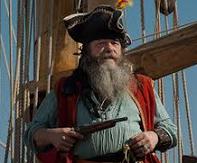Before entering fully into the meaning of the term privateer, it is necessary to discover its etymological origin. In this case, we can establish that it is a word that derives from the French "corsaire" and this in turn comes from the Latin "cursus", which is synonymous with "career".
The concept of privateer derives from privateer . The campaign that merchant vessels, with license from the authorities of their country, carried out in ancient times to pursue enemies or pirates is called privateering.
 The patent of marque authorized navigators to act according to the laws of war . The corsairs, in this way, could sabotage and attack the ships of enemy nations , stealing their merchandise.
The patent of marque authorized navigators to act according to the laws of war . The corsairs, in this way, could sabotage and attack the ships of enemy nations , stealing their merchandise.
According to the dictionary of the Royal Spanish Academy ( RAE ), privateer can also be used as a synonym for pirate . However, both differ in the legality of their actions.
The privateers looted ships with the permission of their country's government , which endorsed these actions in certain circumstances to weaken their enemies. Pirates, on the other hand, engaged in looting at any time and without authorization. In this way, although both privateers and pirates dedicated themselves to theft, the former did so within the legal framework of their homeland.
Many privateers managed to enter history due to the importance of their actions for their countries. The English privateer Francis Drake (1543-1596) was declared a knight and is honored in his land , although the Spanish - victims of his campaigns - consider him a pirate. Something similar happens with the Welsh privateer Henry Morgan (1635-1688).
Amaro Pargo (1678-1747), Juan Bautista Azopardo (1772-1848), Hipólito Bouchard (1780-1837) and Louis-Michel Aury (1788-1821) are other privateers known worldwide.
The privateers have greatly inspired the art world in general. A good example of this are novels such as "The Black Corsair", which was published in 1898 by the Italian writer Emilio Salgari.
The plot of this story takes place in the 17th century, taking the Caribbean Sea as its setting. At that moment, Emilio de Roccanera, known as the black privateer, is willing to do everything possible to take revenge for the death of his brothers at the hands of the governor of Maracaibo.
In his plan he will come across a woman who will captivate him and who can make it extremely difficult for him to commit what he had planned.
In the same way, in the cinematographic field we also have to highlight the existence of films that also use the word in question in their titles. This would be the case, for example, of "The Corsair." Antonio Mollica is the director of this Italian film that was released in 1970.
It revolves around the figure of a pirate who, after being deported by the French, manages to free himself and take over a ship. After that, he will proceed to liberate an island from Portuguese rule.
